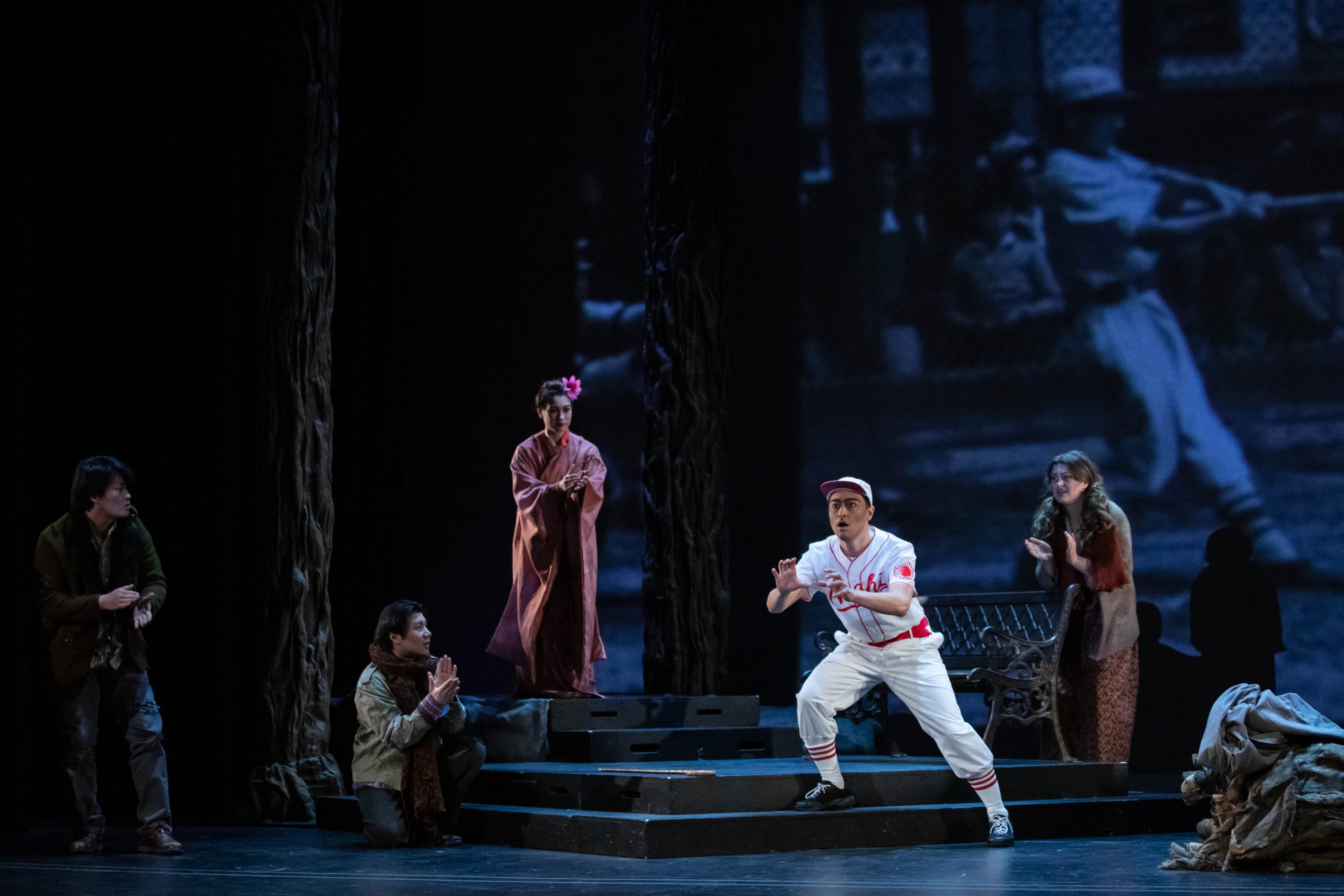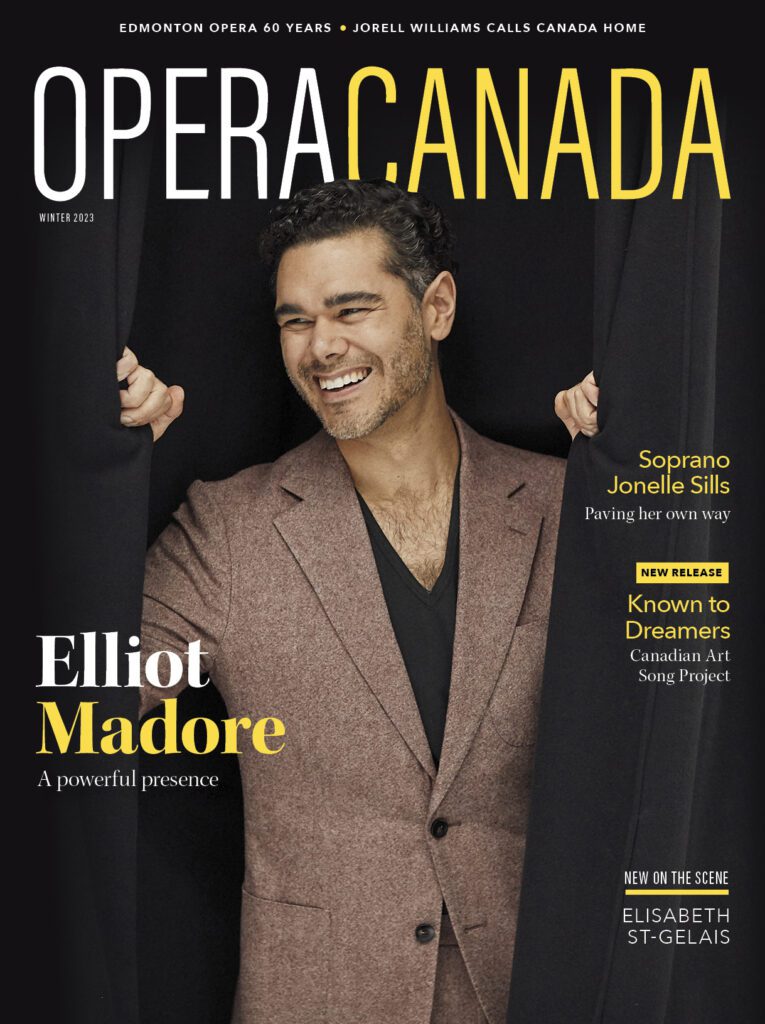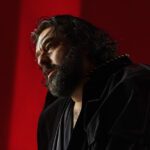Shadow Catch premiered in December 2011, at Vancouver’s Firehall Arts Centre as part of the Vancouver Pro Musica’s Further East/Further West series. It was a fitting location for the work’s debut since the FAC is mere blocks from the much-historied Downtown East Side’s Oppenheimer Park, where the opera is set. Ten-plus-years later, UBC Opera in March gave the opera a second staging. It tells the story of The Runaway, a teenage boy who ends up one night in Oppenheimer Park, where four spirits from the park’s past appear to him in his dreams. Or are they dreams?
The Japanese Noh-influenced libretto by Daphne Marlatt is sparse but poetic and highly focused. The music is by Dorothy Chang, Benton Roark, Jennifer Butler and Farshid Samandari, who each composed, in the order of the names listed here, one of the opera’s four acts. There were no jarring stylistic musical incongruities between the acts, though little of the music is particularly memorable either, albeit entirely apropos for the opera’s prevailingly sombre atmosphere.
The Runaway’s visitors begin with the Maple Tree Spirit from the grove of giant trees decimated by logging in the 1860s after having stood in an area with the aboriginal name K’emk’émelay since prehistoric times. Next, there’s the ghost of a Japanese-Canadian baseball player from Vancouver’s famous Asahi baseball team, which thrived until BC’s Japanese were all banished to internment camps in World War II; then comes the Brothel Keeper, the spirit of a Hastings Street madame from the 1920s; and finally, The Cop, the ghost of a corrupted policeman. All of them wrestle with their own demons in one way or another.
At the Mar. 12 performance, The Runaway, the only character to appear in all four acts, was portrayed by Kevin Kiho Sohn. His light tenor was ideal, even when it faltered occasionally, to depict the vulnerability and fear of a teenager on the run, his stage demeanour naturally theatrical and compelling, particularly when feigning defiance while terrified in the face of danger.
Alyssa Nicole Samson was solid, vocally and in stage presence, as the Maple Tree Spirit, probably the most enigmatic of all. Luka Kawabata, as the spirit of the Asahi Baseball Player (Oppenheimer Park was the team’s home ground) reined in his commanding baritone somewhat in a role that hardly calls for brazen confidence, which was entirely fitting since brazen confidence was hardly called for. The demon haunting him, trifling compared to the others’, is the loss of face he suffered when he missed catching a crucial fly ball in the team’s final game in 1941.
The Brothel Keeper, elegantly and flamboyantly portrayed by Rachel Buttress, is not an easy part to play, but is perhaps the most haunting. Now blind, her spirit seeks forgiveness from Kiyo, her youngest girl, whom she loved dearly but released into the company of a client who murdered her. Kiyo is a mute character, her part voiced in countertenor tessitura by another singer. Clad in a richly exotic Japanese kimono, Emma Jang eloquently mimed the role to Kevin Liu’s vocalizations. Since Liu’s voice did not always emanate from where Jang was on stage, their scenes could be disorienting, almost other-worldly, yet theatrically compelling.
Matthew McLellan was brash and brazen as The Cop, haunted by his fall into corruption during Vancouver police scandals in the 1950s. The opera takes a significant turn when The Runaway sees the violence of his own father and all he has run away from in The Cop raging before him. Realizing his own past must be confronted—that he must catch his own shadow—The Runaway stands up to The Cop and thus begins to open the door to deal with his own issues. And that is as far as Shadow Catch takes us on The Runaway’s journey.
Parvin Mirhardy’s costumes were colorful, subdued, elegant, brash or formal as the clothing of the various characters required. The sets, by Mimi Abrahams, Matthew McLellan and Nancy Hermiston, with Jacob Wan’s projected backdrops and Jeremy Baxter’s deftly subdued lighting, eerily evoked the unsettling ambiance, ever fraught with potential danger, of Oppenheimer Park at night.
The three-member “orchestra”—Paolo Bortolussi, flute, piccolo and alto flute; Sungyong Lim, cello; and Brian Nesselroad, a wide array of percussion—generated a broad array of sonorities and proved flexible and adaptive when the score called for free interpretation. The seven-member chorus was a model of ensemble and clear diction, despite having to lie around the park feigning sleep until it was their time to comment on the unfolding drama. Conductor Jonathan Girard kept the musical forces together admirably.
Firm stage direction by UBC Opera’s Nancy Hermiston allowed the dream logic of the opera its full due, while never sacrificing clarity. Solidly rooted in Vancouver and with an important and timely message about how the past powerfully informs the present, this revival of Shadow Catch was well deserved.
Opera Canada depends on the generous contributions of its supporters to bring readers outstanding, in-depth coverage of opera in Canada and beyond. Please consider subscribing or donating today.












